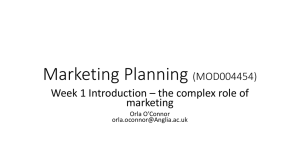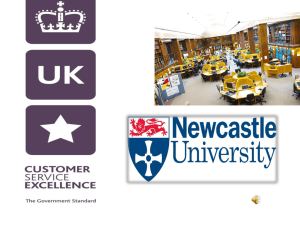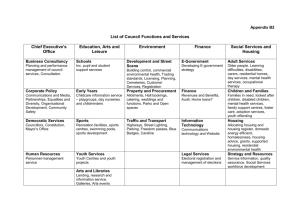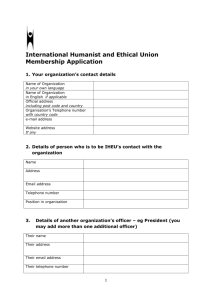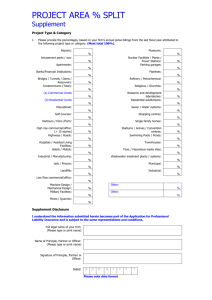Assessment Centres
advertisement
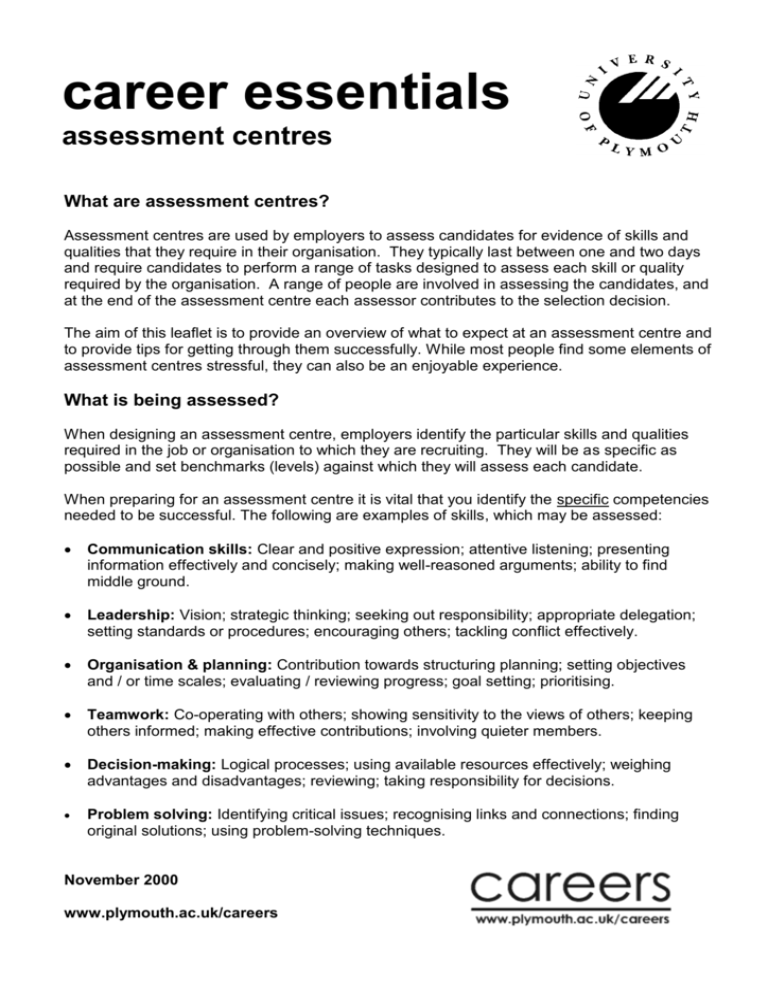
career essentials assessment centres What are assessment centres? Assessment centres are used by employers to assess candidates for evidence of skills and qualities that they require in their organisation. They typically last between one and two days and require candidates to perform a range of tasks designed to assess each skill or quality required by the organisation. A range of people are involved in assessing the candidates, and at the end of the assessment centre each assessor contributes to the selection decision. The aim of this leaflet is to provide an overview of what to expect at an assessment centre and to provide tips for getting through them successfully. While most people find some elements of assessment centres stressful, they can also be an enjoyable experience. What is being assessed? When designing an assessment centre, employers identify the particular skills and qualities required in the job or organisation to which they are recruiting. They will be as specific as possible and set benchmarks (levels) against which they will assess each candidate. When preparing for an assessment centre it is vital that you identify the specific competencies needed to be successful. The following are examples of skills, which may be assessed: Communication skills: Clear and positive expression; attentive listening; presenting information effectively and concisely; making well-reasoned arguments; ability to find middle ground. Leadership: Vision; strategic thinking; seeking out responsibility; appropriate delegation; setting standards or procedures; encouraging others; tackling conflict effectively. Organisation & planning: Contribution towards structuring planning; setting objectives and / or time scales; evaluating / reviewing progress; goal setting; prioritising. Teamwork: Co-operating with others; showing sensitivity to the views of others; keeping others informed; making effective contributions; involving quieter members. Decision-making: Logical processes; using available resources effectively; weighing advantages and disadvantages; reviewing; taking responsibility for decisions. Problem solving: Identifying critical issues; recognising links and connections; finding original solutions; using problem-solving techniques. November 2000 www.plymouth.ac.uk/careers What might an assessment centre involve? The format of assessment centres varies depending on: the nature of the job for which candidates are being assessed the particular competencies that are required facilities and time available the nature of the organisation The following activities are typically used: 1. Group exercises Group exercises typically involve participants in one of the following: task solving e.g. cross a fast flowing river with a plank and a ball of string discussion exercises e.g. the low price of petrol is the main cause of global warming role plays e.g. you are assigned a role in a company - managing director, PR manager, human resources manager, technical manager, product manager, finance manager – and set a task which involves participants in assuming their role in solving a given task. During the exercises one or more observers will watch the group in action and record evidence of positive and negative behaviour. Before the exercises somebody in your group may be asked to take on the role of leader. Alternatively groups may be ‘leaderless’. Where a leader is assigned observers will assess that person for their leadership qualities and the other members of the group to see how they respond in this situation. In leaderless groups observers will be looking for natural leaders to come from within the group. In both instances, observers are looking for evidence from everybody of teamwork skills, cooperation, ideas, problem solving, organisation, etc. 2. Presentations As highlighted in the last example, there may be many opportunities to make a presentation at an assessment centre! Presenting your team’s response to a group exercise Presenting a view point as part of a role play You may be given a topic on which to make a presentation (or asked to determine your own topic) 3. Written tests Similar to the role-play task, you may be given a range of information and asked to assimilate this into a written report. Another variation on this theme is to be given information or tasks and asked to prioritise them, including your rationale. 4. Psychometric assessments There are generally two types of psychometric assessments used at assessment centres – aptitude tests and personality questionnaires. These are dealt with in more detail in the free AGCAS leaflet ‘Psychometric Tests – What are they and how to prepare for them’. Aptitude tests assess logical reasoning or thinking performance - not general knowledge. They are designed to assess abilities relevant to particular jobs or tasks and do not assume a range of existing skills. This means that they measure potential (or aptitude). Test batteries typically include verbal, numerical and diagrammatic reasoning questions in a multiple-choice format. They are administered under strict exam conditions and the questions have right and wrong answers. Each candidate’s score is compared with a representative ‘norm’ group for each test. You may be sent sample questions before the test. Employers use aptitude tests in one of two ways: to cream off the best applicants or to ensure that successful candidates achieve a minimum level required for the job for which they are applying. Personality questionnaires are based on self-report - how you perceive yourself and how you would typically behave in given situations. Questions typically take one or more of the following formats: Rating questions e.g. ‘I enjoy social gatherings’ (rate from 1 ‘not at all’ to 5 ‘very much’) Choice questions e.g. Which of the following is most and least like you: a highly organised person, anxious when meeting new people, the ‘life and soul’ of the party, an energetic person Yes / No questions e.g. ‘I like to try new ways of doing things’ (True / False) When you have completed a personality questionnaire the results are analysed and your personal profile produced. Employers use this in selection by comparing your profile with an ideal profile created for the job. To be successful your profile needs to closely match that of the job. So long as you are applying for a job for which you are suited you should face no difficulties with personality questionnaires. They are not timed so you can work at your own pace. Answer honestly, trust your first impressions (rather than over-analysing questions) and try to answer all the questions. 6. Evening at the bar / dinner with recent graduates You will be told this is your opportunity to find out what the organisation is really like, and to all intents and purposes it is. However, you are still being assessed and so use the free bar sparingly. Employers will be making a mental note of how well you interact with others, how well you relate to new people and whether you are likely to fit in to their organisation? Before checking out the cocktails menu think about questions you want to ask of the graduates e.g. what is it like working for the organisation, how is your career likely to progress, etc. Beware, however, of becoming the bore who wants to impress so much that you talk of nothing but the company and how much you’ve read up on them. Be yourself. 6. Site visits A chance to look around and find out more about the organisation. Try to ask sensible and informed questions – car parking requests can usually wait until later. 7. Interviews At assessment centres you are likely to encounter two types of interview (dealt with in detail in our Careers Essentials leaflet on interviews): General interviews used by employers to assess the general skills they require e.g. teamwork, problem solving, and leadership. Questions take the form ‘give me an example of when you have led a team / organised an event / solved a problem. What did you do and how well did you do it’. In answering these questions it is vital that you present evidence of what you did. It is often personnel staff or general managers who conduct these interviews. Technical interviews used to test what you have written in your application about the technical skills and experience that you possess. This means going into more detail about the applied problem solving skills you used in increasing Microsoft’s profit margin by 33% during your sandwich placement. Your interviewer(s) will have a technical background in your area which means they can talk on your wavelength. Who is doing the assessing? A range of people are involved in facilitating and assessing assessment centres. Each will be involved in observing, recording and classifying your behaviours on different activities during the day and assessing them against their required competencies. At the end of the assessment centre all of the assessors will feed their comments into a discussion to agree whether you have been successful or not. It is important to remember that you are being assessed throughout the whole assessment centre. 10 tips to help you succeed at assessment centres 1. Get to know as much as you can about the tests and exercises you will be doing before the assessment centre 2. Identify the competencies assessors will be looking for 3. Practice some of the more practical exercises, e.g. tests 4. Remember you are being assessed (nearly) all of the time 5. Watch the clock during assessments 6. Put across your point of view during discussions but know when to compromise 7. Attend a preparatory workshop prior to attending an assessment centre 8. Reflect on how you are doing at the assessment centre as you are going through it 9. Try to get feedback after assessment centres 10. Be yourself Further Information and Advice Career Essentials – Interviews AGCAS leaflet ‘Psychometric Tests – What are they and how to prepare for them’ Prospects Directory AGCAS video – ‘The Assessment Centre Video’ How to succeed at assessment centres (in 'Job Search' collection in Careers Centres)
